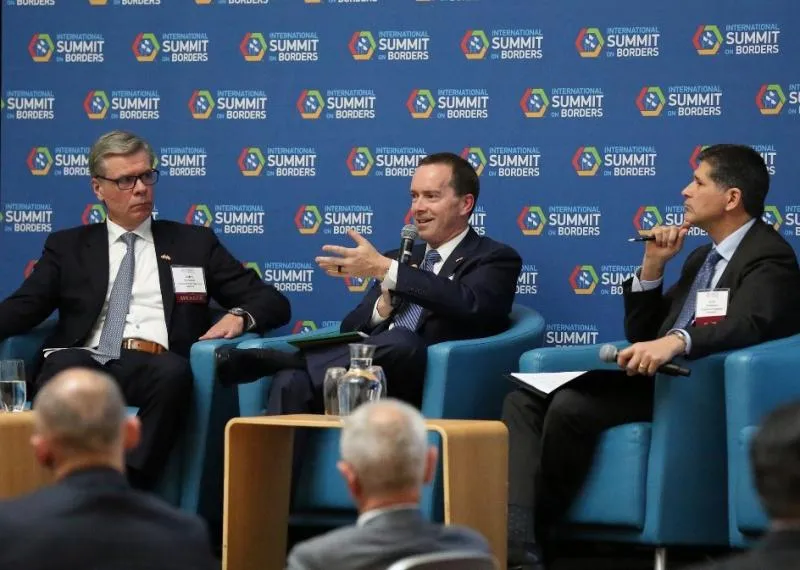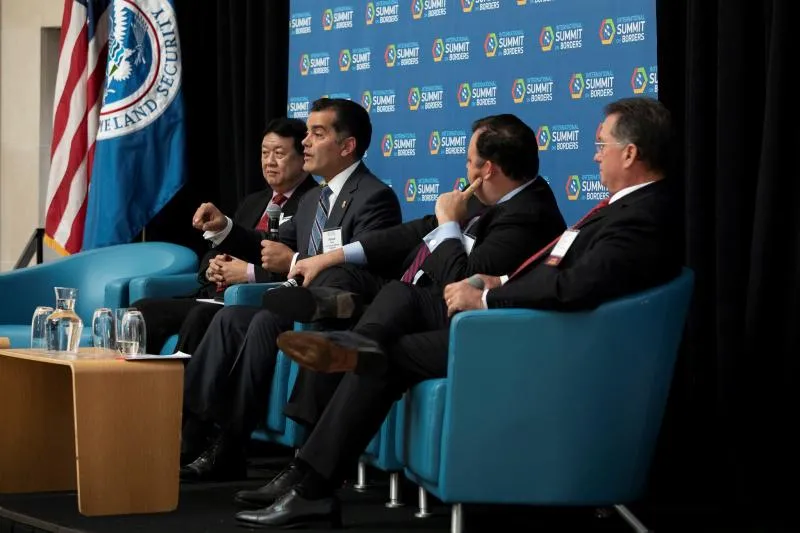The growing number of illegal migrants pushing through the Southwest border is unprecedented, noted U.S. Customs and Border Protection (CBP) Deputy Commissioner Robert Perez during a morning panel discussion at the International Summit on Borders, June 18, in Washington. “It’s unlike anything we’ve seen before,” since most are traveling as families with children. “Just last month alone, there were 144,000 apprehensions along our Southern border of illegal migrants,” he said. “Over 100,000 of that 144,000 in one month were children and families.”

about his role in leading CBP’s roughly
60,000 men and women at the International
Summit on borders. Photo by Donna Burton
Those demographics have diverted more than half of CBP’s resources normally set aside for border protection to providing humanitarian assistance, such as shelter and medical needs. “We are a border security agency now being called upon to deal with things we’re not designed for,” said Perez.
Driving the surge more than ever are transnational criminal organizations who understand the loopholes in U.S. immigration law. These loopholes include rules limiting migrant detentions to 21 days or assuring entry into the U.S. when accompanied by a child. Criminals and smuggling rings exploit these shortcomings by flooding social media platforms in Northern Triangle countries with advertisements presenting these weaknesses as opportunities when soliciting for new travelers, Perez explained. “This is a business endeavor for them,” he said.
“They figured out with relative ease what the loopholes were and the reality on the ground to oversaturate the system.” Now, up to 90 percent of the apprehensions are the result of alien smuggling organizations charging up to $7,000 per person, Perez added.
Acting Homeland Security Secretary Kevin McAleenan, the summit’s opening keynote speaker, also drew that conclusion. Despite the drop in murder rates and improving economies in the Northern Triangle, he said smugglers are not hurting for business.
“The signal is, if you bring a child you’ll be released and allowed to stay in the U.S.,” he stated. “It’s an incentive and a tremendous risk for children.” In many cases, someone posing as a parent accompanies the child. “The Border Patrol has detected almost 5,000 adult-child relationships that were fraudulent.”

discussed the changing demographics of those
entering the U.S. illegally during a panel
discussion at the International Summit on
Borders. Photo by Donna Burton
McAleenan said transnational criminal organizations are also mainly responsible for the flow of opioids and meth into the United States along with fentanyl from China.
Later that afternoon, Acting CBP Commissioner John Sanders shared a leadership panel with John Ossowski, president of Canada’s Border Services Agency. Strengthening CBP’s partnership with CBSA is one of his goals and his approach is uncomplicated. “Empathy is key to building partnerships,” he said. “You need to put yourself in their shoes.”
Sanders said border security is his top priority and like other leaders, he’s also troubled by resources being redirected from that task to conduct hospital watches for illegal migrants. He spoke about a recent trip to New Mexico as an example, where just seven agents are patrolling a 130-mile stretch of the border. “We’ve got to get back to our law enforcement mission.” Sanders said.
He also sees his role to defend the agency’s mission and people. “What bothers me immensely as an American is the ire that’s directed toward CBP as opposed to directing it to the problem,” Sanders said. “I spend a lot of time educating Congress about the great job the men and women of CBP are doing to uphold the laws of this country.”
The International Summit on Borders brings together global leaders, practitioners and border security stakeholders to discuss the challenges, trends and issues in defending national borders.

